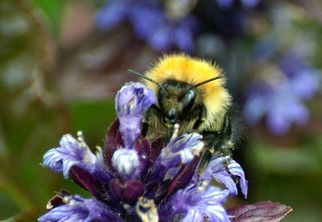Bee disease confirmed in Perthshire

American Foulbrood (AFB) found in the Stanley area of Perthshire
An outbreak of American Foulbrood (AFB) has been found in a single hive in an apiary in the Stanley area of Perthshire.
The infected hive was detected by the beekeeper with the disease being confirmed by SASA on 21 May 2021. This is the first finding of AFB in Scotland this year. The beekeeper concerned has been informed of the finding and is cooperating with the Scottish Government bee health inspectors.
AFB is a notifiable disease that affects colonies of honeybees. The infected hive will be destroyed as there is no permitted treatment for the disease in the UK. Beekeepers within 3 km from the affected colony will be alerted via BeeBase and encouraged to increase their biosecurity.
Chief Veterinary Officer for Scotland Sheila Voas said:
“The finding of AFB is disappointing however it is a timely reminder that beekeepers should remain vigilant for signs of the disease at all times and it emphasizes the important work of the Scottish Government Bee Health Team.
“As determined by legislation, appropriate action will be taken. There is no treatment permitted in the UK for AFB and therefore the bees, combs or bee products from the hive are required to be destroyed (by burning) whilst the hive, debris from the hive and any appliances or other things liable to spread the disease will be served with a notice requiring either treatment (sterilisation) or destruction.
“The movement of bees and related equipment into, or out of, the affected apiary will be under specific controls supervised by Scottish Government Bee Inspectors and will include enhanced biosecurity measures and increased vigilance in the area.
“I would reiterate that while this is disappointing, there are no risks to public health from AFB and no implications for the quality and safety of Scottish honey.”
Background
AFB is a notifiable disease under The Bee Diseases and Pests Control (Scotland) Order 2007.
It is caused by a spore forming bacterium called Paenibacillus larvae. These spores are the infective stage of the disease and infection begins when food contaminated with spores are fed to larvae by the nurse bees. Once in the gut of the larva the spores germinate, bacteria move into the larval tissues, where they multiply enormously. Infected larvae normally die after the cell is sealed and millions of infective spores form in the larval remains. P. larvae spores remain viable for many years and are very resistant to extremes of hot and cold and to many disinfectants.
AFB is the more serious of the two notifiable diseases (the other being European Foulbrood) and must be dealt with promptly as it can be spread by honey bees themselves.
As soon as the notifiable diseases European foulbrood (EFB) and/or American foulbrood (AFB) is suspected the beekeeper becomes subject to The Bee Diseases and Pests Control (Scotland) Order 2007 (as amended) which prohibits removal of hives, bees, combs, appliances etc. from the premises affected except for the purpose of submitting a sample for laboratory tests.
Following destruction, the Scottish Government Bee Health Team will make arrangements to undertake follow-up inspections in contact colonies in the area.
Scottish Government does not pay compensation for destruction of hives infected with AFB.
Beekeepers should make sure they are aware of the symptoms of AFB and report suspicion of disease to the Bees_mailbox@gov.scot Please also use this email if you encounter any problems or have any questions.
All beekeepers are encouraged to register in BeeBase so the Scottish Government Bee Health Team can assess if there has been a risk of disease spread to their bees. This is all more important for those within this area where disease has been confirmed. BeeBase is completely safe and the location of the apiaries can only be seen by the Scottish Bee Health Team. Free registration is available at the National Bee Unit website
BeeBase ensures that other beekeepers in the area are automatically alerted when notifiable disease is found in the area.
Local Beekeeping Associations will also be informed and will be reminded to ask their members to remain vigilant and of the need to maintain strict biosecurity.
Find out more:


